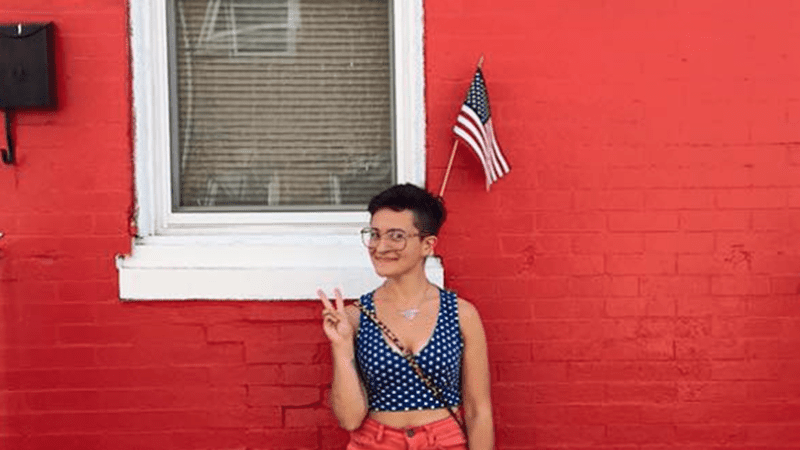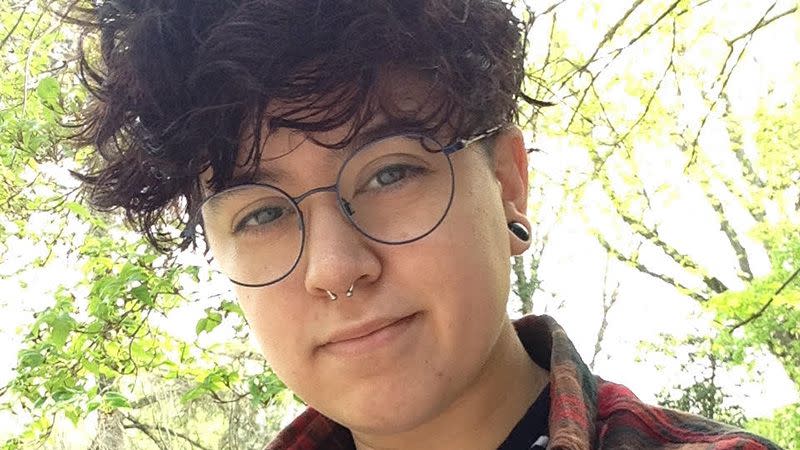What It Really Means to Be Gender Fluid or Identify As Non-Binary
Here's a narrative: We are born. We are assigned a sex at birth. We grow up, enter puberty, and emerge (relatively) unscathed. Throughout all of this time, our gender identity (e.g., girl/woman) corresponds with the sex we were assigned at birth (e.g., female). This is a simple narrative many people are familiar and identify with, but it's simply that-one single narrative.
Sex and gender are often viewed as interchangeable terms, and the gender binary is often viewed as having two distinct fixtures: male/man, and female/woman. But the sex we're assigned at birth might not align with our gender. And in some cases, we might not identify with either end of the gender binary. Simply put, non-binary is a term "used by some people who experience their gender identity and/or gender expression as falling outside the categories of man and woman," according to GLAAD. Also crucial to note? Gender identity and sexual orientation are not the same. (See Caitlyn Jenner, who has said that she's still attracted to women exclusively.)
Those who fit into the "classic" narrative are referred to as cisgender, often shortened to "cis" (the literal Latin translation is anyone who is not trans). When we talk about the second narrative, those who identify as transgender (or "trans"), non-binary, genderqueer, or gender non-conforming (among many other identifiers and subgroups), are grouped under the trans umbrella, an inclusive method of denoting that gender identity and expression are varied and valid, subject to develop or evolve as people develop and evolve, and not cis. (For detailed explanations of each of the terms in the LGBTQIA acronym, refer to page 6 of the GLAAD Media Reference Guide.) It's also important to note that many people who identify as non-binary often do not align with he/him or she/her pronouns; a singular they/them pronoun is commonly used among non-binary individuals.
Below, six people share what they wish everyone would understand about being non-binary.
"People should be allowed room to explore their gender." (You included.)
Francisco, 30, writer and community health worker in Washington, DC
Self-described gender identity: Non-binary femme, fluid, my own, ever-changing
"There's a compulsion to categorize or label me, which I'll always reject. That's how people are conditioned, to sum you up and place you in the appropriate box. Most people see the beard and assume I identify with men. Then, they take notice of my mannerisms, my partner, and the work I do in the community and assume I'm a gay man specifically. My partner is a gay man, which is irrespective of how I identify my own gender or sexuality. That's really challenging for some people to comprehend, but they don't really need to understand it to respect it. I love and find myself attracted to all sorts of people, including gay men and most passionately my partner.
"There is no one way of being non-binary. The beauty of it is in the freedom of mind and expression, I think. There are no rules here. People should be allowed room to explore their gender, to self-determine what that is, to change it as much or as often as necessary, to not be gendered at all. This can be considered a trans experience but also doesn't have to be. I want people to know they can be just who they are, that they can identify or express how they choose, and that it's more than enough."
"Don't refuse our humanity."
Link, 27, a children's librarian in Philadelphia
Self-described gender identity: Genderqueer, non-binary

"I occupy queer women's spaces in a lot of ways, including socially, romantically, and professionally. I'm petite, curvy, and generally dress in a flamboyant and feminine way. Based on this, people assume I'm a woman and rarely ask for pronouns. My students and their families default to calling me "Miss" or "Ms." So I usually correct them to just call me by my first name. Although I generally only date other queer people, straight men hit on me assuming that I identify as a woman (and therefore someone they may be interested in). Last year I was diagnosed with polycystic ovary syndrome (PCOS) and my doctor was very concerned with addressing some of the aesthetic symptoms (excess body hair, difficulty losing weight), but I didn't express any discomfort with these visual things that people who are read as women might be assumed to care about.
"Someone identifying as non-binary probably doesn't affect you much. Don't refuse to try when people are asking you to recognize their humanity. Don't be a jerk."
"We're not all transitioning."
Ash, 25, cook in Abington, PA
Self-described gender identity: Non-binary

"People see my short hair and masculine style of dress and assume that I'm a butch lesbian. I also wear a binder and some people assume I'm transitioning or working my way up to it. I work in a supermarket and have to answer questions and do customer service-related tasks on occasion, and customers always use she/her pronouns or assume my name is a nickname for 'Ashley' and call me that instead of my name that I introduced myself with. One of my coworkers constantly misgenders me. She usually calls me 'girlfriend' all shift and then is super apologetic if I call her out on it, but never really changes her habits. Because I'm tired of explaining it, this has led me to question if explaining my identity to my mostly cis, straight coworkers is worth it.
"Being non-binary is not the same as being a lesbian or a just a lead-up to transition, and respecting pronouns and names should not be viewed as OK to mess up."
"I'm not 'confused.'"
Luka, 20, artist in Detroit
Self-described gender identity: Non-binary, trans, and simply queer
"The majority of the people around me assume I am a stud [a masculine-presenting lesbian, usually a woman of color] or butch. They assume this when I'm dressed in menswear. Other times, when I'm dressed more feminine, in dresses or wearing makeup, they'll see me as a girl. When dressed more androgynous, I'm occasionally mistaken for a boy. When it comes to my sexual orientation, people normally assume I'm a lesbian or they just really have no clue. When it comes to my identity, a lot of people just assume it's not real. I've had people tell me I'm just confused. They feel it's not necessary to respect my pronouns because they see me as girl and that's only how they'll address me.
"One time I was shopping for some pants in the men's section; it was my first time doing so outside of the Internet and I was having trouble finding my size. When one of the employees (a guy) came up and asked me if I needed help, I asked him for the smallest size they have. While he's searching, he asks if I'm buying them for my boyfriend. I smiled and said, 'No, they're for me.' He looked up, made a funny face, and said, 'Ain't you a girl? Why you buying guy clothes?' I felt a bit of a lump form in my throat as my heart began to race, sending my body into a familiar mode of panic. I nervously shrugged and said, 'It's just my style'. I didn't have as much confidence in my identity back then.
"Non-binary people are not looking for attention or just trying to be different or special. We are trying to be ourselves. We are valid. What we feel is valid, and how we experience gender is not wrong because of how you feel about it. Gender is a dope ass spectrum. Live and let live."
"Confronting everyday transphobia isn't always safe."
Fae, 21, social work student in Ottawa, Ontario
Self-described gender identity: Non-binary femme
"Much of the time, people assume I'm a guy wearing women's clothes, or a 'really gay' guy-which has its own set of problematic assumptions in and of itself. We like to think of queer spaces as anti-oppressive and affirming of diverse identities, but the reality is that especially in queer male spaces, there's a lot of transphobia and femme-hate that goes on (not to mention the racism experienced by black folks and people of color). Presenting feminine and identifying as non-binary on 'gay dating apps' like Grindr has lead to me receiving discriminatory messages, being fetishized, or (and most often) downright ignored, because of how much our society values masculinity and disregards those of us who transition towards feminine expressions and identities.
"I think, as a trans person, there's a big risk involved in confronting the everyday transphobia you experience. Every time someone misgenders me, I want to correct them, but it's not always safe to do so. If I don't know you, asserting my pronouns and correcting your mistakes can lead to a bigger mess than the misgendering in the first place. When in environments where I feel safer, I'll correct people to the best of my ability. I'd love to live in a world where asserting my pronouns wasn't met with confusion, and where the burden of explaining my identity didn't rest on me, but on the institutions around us.
"I'd really like to see society embrace diverse gender identities and diverse gender expressions in all people. We need to support straight cisgender men to express femininity if and when they want to, and do the same for queer, trans, and non-binary people of all identities. We need to fight for a world where anyone can express their genders in whatever ways they feel most comfortable and empowered."
"Don't be afraid to ask about pronouns."
Mandy, 22, registered vet tech, St. Louis
Self-described gender identity: I have never felt as if I fit in as either male or female; I have just felt that I don't have a gender.
"People assume that I am a girl because I'm AFAB (assigned female at birth), wear makeup often, still wear some clothes from the women's section, and have very feminine features. Most people assume that being non-binary has to do with my sexuality rather than my gender. When I came out to a coworker, she claimed there was no way I could be agender because I look so feminine. I explained to her that just because I appear a certain way doesn't mean it determines my feelings toward how I perceive myself. I often get comments or messages on my Instagram telling me that I've made this up and there are only two genders, so this means I must be female and mentally ill for believing that I'm something other than the body I was born with. I typically am understanding that most people just genuinely don't know about the topic and I try to explain it to the best of my ability. But sometimes, the comments can be very hurtful and it can be hard not to get defensive. Stop assuming everyone's gender is what they were assigned at birth. Don't be afraid to ask for someone's preferred pronouns, especially if you are unsure about how they identify. I understand that most people just genuinely don't know about the topic, but it's important to be accepting and respectful."

